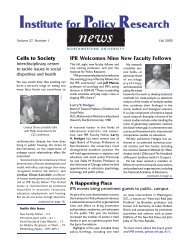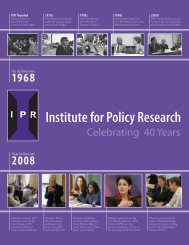pdf - Institute for Policy Research - Northwestern University
pdf - Institute for Policy Research - Northwestern University
pdf - Institute for Policy Research - Northwestern University
Create successful ePaper yourself
Turn your PDF publications into a flip-book with our unique Google optimized e-Paper software.
showing that prejudice often takes on<br />
<strong>for</strong>ms not well captured by traditional<br />
survey approaches.<br />
Quillian continues to study race and<br />
biases in perceptions of the risk of<br />
criminal victimization. He and Devah<br />
Pager of Princeton <strong>University</strong> examine<br />
how perceptions of the risk of becoming<br />
a victim of a burglary or robbery compare<br />
with actual victimization rates. By<br />
layering data from the 1994 to 2002<br />
Survey of Economic Expectations and<br />
Census zip code in<strong>for</strong>mation, they find<br />
more people believe they will become<br />
crime victims than is borne out by victimization<br />
rates. Their results also show<br />
that neighborhood racial composition is<br />
strongly associated with perceived risk of<br />
victimization among white respondents,<br />
although actual victimization risk is<br />
driven by neighborhood socioeconomic<br />
status.<br />
Quillian is also studying how residential<br />
income segregation factors into<br />
educational inequalities between<br />
adolescents with different socioeconomic<br />
backgrounds. He finds that young adults<br />
from poor families were more likely to<br />
drop out of high school and less likely<br />
to attend college if they live in more<br />
income-segregated metropolitan areas.<br />
Adults raised in more affluent families,<br />
on the other hand, were neither more<br />
likely to graduate from high school nor go<br />
onto college in more income-segregated<br />
metropolitan areas; they did not gain<br />
educationally from segregation.<br />
With Rozlyn Redd of Columbia<br />
<strong>University</strong>, Quillian has completed a<br />
review and analysis of studies of the role<br />
of social capital in maintaining persistent<br />
racial gaps in poverty rates in the United<br />
States. They focus on four prominent<br />
social capital explanations relevant to<br />
poverty disparities: job search networks,<br />
neighborhood collective efficacy,<br />
ethnicity in social networks, and networks<br />
of school friends. They find the latter<br />
three to have a greater effect on racial<br />
gaps in poverty, but argue that social<br />
capital alone can explain only a small<br />
share of racial differences in poverty rates.<br />
Segregation in the job market has been<br />
another challenge faced by all modern<br />
equality movements,<br />
according to historian<br />
Nancy MacLean, who<br />
specializes in the history<br />
of social movements and<br />
public policy. Her most<br />
recent book, Freedom Is<br />
Not Enough: The Opening<br />
of the American Workplace<br />
(Harvard <strong>University</strong> Press/<br />
Russell Sage Foundation),<br />
reveals how central the<br />
quest <strong>for</strong> better jobs was<br />
to the black freedom<br />
movement, women’s<br />
movement, and Mexican American civil<br />
rights movement. She concludes that<br />
creating more good jobs <strong>for</strong> all Americans<br />
is vital to fulfill the vision of human rights<br />
<strong>for</strong> which these movements labored.<br />
MacLean is now working on a book that<br />
will trace the closing of schools in Prince<br />
Edward County, Va., from 1959 to 1964.<br />
The closings grew out of the state’s policy<br />
of “massive resistance” to Brown v. Board<br />
of Education advocated by Southern<br />
segregationists. This five-year struggle also<br />
generated the first push <strong>for</strong> the tuition<br />
grants and school vouchers that later<br />
became a national cause of conservatives.<br />
Racial Profiling<br />
From 2002 to 2006, economist Charles<br />
F. Manski led a research network of 11<br />
economists who explored substantive and<br />
methodological issues in analyzing social<br />
interactions. The economists quickly<br />
turned to racial and ethnic profiling,<br />
seeing a pressing need to bring serious<br />
Greg Duncan and Lincoln Quillian<br />
discuss an IPR colloquium on Gautreaux.<br />
P. Reese<br />
www.northwestern.edu/ipr 19
















